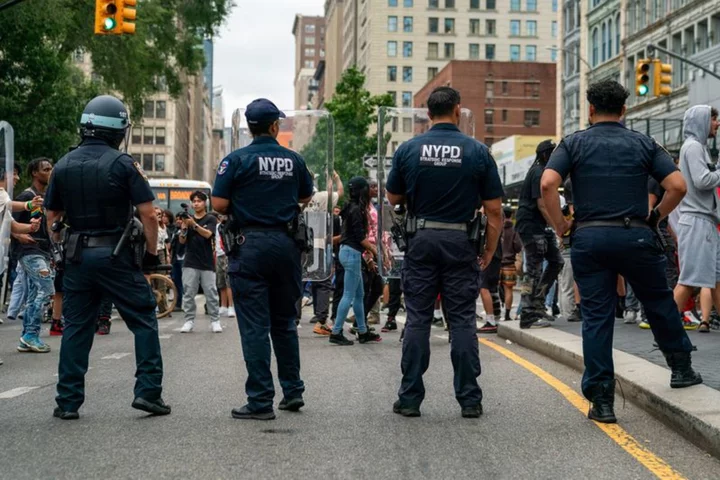WASHINGTON, DC: In a courtroom verdict that aimed to send a clear message about the consequences of attacking the US Capitol on January 6, 2021, Shane Jenkins, a 46-year-old man from Texas, was sentenced to seven years in prison on Friday, October 6.
Jenkins' actions during the siege, including attempting to smash a Capitol window with a metal tomahawk and hurling makeshift weapons at police officers, were considered both violent and destructive. Jenkins has also found himself in the spotlight for his association with a website that sells merchandise portraying jailed rioters as "political prisoners."
The website not only showcases Jenkins but also promotes slogans like "Free the J6 political prisoners" and "Want my vote? Help the J6ers." It features the notorious mugshot of former President Donald Trump over the words "Indicted we stand."
Prosecutors' concerns over finances
Prosecutors expressed concern over the money generated from the website's merchandise sales, with Jenkins collecting over $118,000 in donations through another fundraising platform.
In their court filing, they accused him of capitalizing on his involvement in the January 6 events to build a brand for financial gain, stating, "Far from contemplating the harm he has caused, examining his conscience, feeling shame for his actions, and resolving to change, Jenkins has chosen to use his January 6 status to garner money and attention."
However, Jenkins' defense attorney, Dennis Boyle, contended that Jenkins had not received money from the sale of January 6 merchandise and did not own the website. Boyle could not identify the actual owner.
US District Judge Amit Mehta, who delivered Jenkins' sentence, condemned his actions and the exploitation of his role in the riot. The judge firmly rejected the notion that Jenkins and other jailed rioters are political prisoners who cannot receive a fair trial. Judge Mehta emphasized, "Nothing could be further from the truth. It's all on video."
In a moment of reflection, Jenkins expressed remorse for his actions on January 6, admitting that he got "caught up in the heat of the moment." He told the judge, “I love this country. And I’m not some crazed maniac set out to destroy this nation.”
However, the prosecution had initially recommended a much longer prison sentence of 19 years and eight months and requested a fine equal to the $118,888 Jenkins had publicly raised. Judge Mehta ultimately denied their request for a fine and declined to impose a "terrorism" enhancement.
Jenkins' journey to Washington, DC, from Houston was driven by his belief in baseless claims of election fraud, with prosecutors asserting that he envisioned a "medieval melee style battle" at the Capitol.
Boyle argued that Jenkins' actions on January 6 were motivated by a "misunderstanding about the election," distinguishing him from those who continue to propagate falsehoods about the 2020 presidential election results.
“There remain many grifters out there who remain free to continue propagating the ‘great lie’ that Trump won the election, Donald Trump being among the most prominent,” Boyle wrote. “Mr. Jenkins is not one of these individuals; he knows he was wrong.”
Complicated background and prior incidents
Boyle also revealed Jenkins' turbulent past, including a traumatic upbringing and a previous incident where he shot and killed his stepfather in self-defense after facing death threats, though he was not charged in the 1997 killing.
Despite acknowledging that Jenkins was not prosecuted for his stepfather's death, the prosecution pointed to his extensive criminal record before January 6, which included assault convictions, as evidence of a "penchant for violence."
Furthermore, in July, Jenkins was involved in assaulting another Capitol riot defendant, Taylor Taranto, along with 11 other inmates at the jail in Washington. This incident reportedly occurred when Taranto made derogatory comments about Ashli Babbitt, a rioter fatally shot by a police officer inside the Capitol, and Babbitt's mother.
Prosecutors have argued that Jenkins played a pivotal role in the January 6 attack, striking a Capitol windowpane six times with the spike end of his tomahawk, eventually breaking the shatter-resistant glass.
“Are we going in or not?” Jenkins apparently shouted at the charged-up crowd.
This allowed rioters to enter a conference room, where they created improvised weapons from broken wooden furniture and used them to attack police officers guarding an entrance in a tunnel on the Capitol's Lower West Terrace.
“It is difficult to overstate the significance of Jenkins’ actions at this location,” prosecutors wrote. “As the first to attack this window, Jenkins crossed a line that had previously not been crossed at the (Lower West Terrace) — he had attacked the Capitol itself.”
Jenkins' sentencing highlights the ongoing legal repercussions faced by those involved in the January 6 attack on the US Capitol. More than 1,100 individuals have been charged with federal crimes related to the events, with the majority of them pleading guilty or being convicted, resulting in a range of prison terms, the Associated Press reported.









